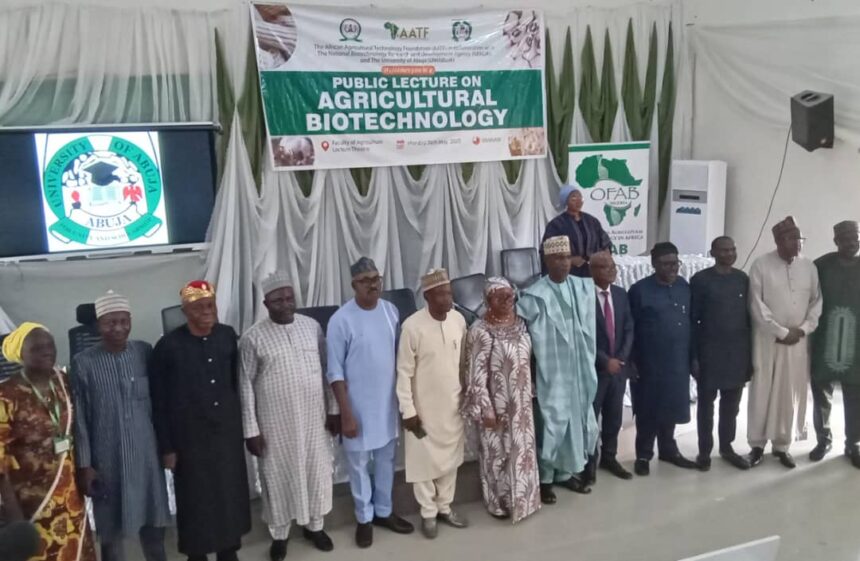By Onche Odeh
Countries in Africa have been urged to do more than they are currently doing to make the best toward becoming food secure, a milestone experts and policy drivers have said is firmly hinged on the speedy adoption of modern technology.
With specific emphasis, scientists from leading research institutions in Nigeria, including the Institute for Agricultural Research (IAR) at Ahmadu Bello University, Zaria, Nigeria’s frontline biotechnology agency, the National Biotechnology Research and Development Agency (NBRDA), budding science students and lecturers and representatives of agricultural technology agencies who converged at the University of Abuja in Nigeria’s Federal Capital for a Public Lecture on Agricultural Biotechnology on Monday have been told to recommit themselves to taking actions aimed at leapfrogging some of the identified challenges.
Speaking pointedly to this, Director of Programmes and Commercialization at the African Agricultural Technology Foundation (AATF), Dr Emmanuel Okogbenin said the first step is to acknowledge the hurdles to the adoption of modern technologies, like agricultural biotechnology which has been identified as the fulcrum to Africa’s drive towards becoming food secure.
In his remarks delivered by Dr Yarama Ndypiaye, Manager of the TELA maize project at AATF, Okogbenin said, although countries like Nigeria, Ghana and Kenya have made credible strides in the adoption of modern agricultural technology in Africa, there are hurdles that cannot be ignored.
According to him, the public lecture being hosted by the Faculty of Agriculture at University of Abuja is timely, adding that it came at a critical time when Africa is facing challenges of food security.
“Across the continent, countries are facing the compounded challenges of food insecurity, climate change, and a need for inclusive economic growth. Agricultural biotechnology when responsibly developed and effectively adopted—offers a powerful set of tools to help us address these challenges,” he said.
Speaking further, he said, “Nigeria and Kenya, along with Ghana, stand out as leaders on the continent, having made significant progress in commercializing biotech crops such as Bt Cotton, Bt Maize, and PBR Cowpea. Kenya is also progressing toward the approval of virus-resistant cassava. These innovations are not just scientific milestones—they represent real opportunities to transform lives, improve farmer livelihoods, and enhance national food systems.”
Regardless, he said, “Regulatory uncertainties, persistent misinformation, and public skepticism continue to slow adoption.”
Immediate past Director General of Nigeria’s National Biosafety Management Agency (NBMA), Dr. Rufus Ebegba, in his presentation stated that new technologies often offers great potential, adding that all technologies are meant to serve a purpose.
“There is no technology that is without hazard, whether biological, chemical or physical. The level of the hazard and the exposure determines the safety level of the technology and its products,” he said.
Relating this to the safety quotient of Genetically Modified Organisms (GMO), he said, “Absolute safety is not an achievable goal. But GMOs have not been found to cause any of the dangers that it has been associated with by the activists that are campaigning against it worldwide.”
But for African countries to achieve a considerable level of safety comparable to the developing world, Dr. Ebegba said, “As with any new technology, irrespective of its tremendous benefit, there is need for appropriate regulation, for the protection of man, economy and the environment from potential risks that may be associated with it. It is also to ensure that technology is not maliciously used.”
He also said that Africa could ensure safety of emerging technologies if countries ensure that the legal and institutional arrangements meet internal standards, engage in routine biosafety risk assessment and surveillance, promote exchange of ideas and cooperation nationally and internationally on Biosafety and biosecurity issues, among other suggestions.
This was corrobrated by the Director, Agricultural Biotechnology at NBRDA, Dr Rose Gidado, who said emerging technologies like the development of genetically engineered crops must be guided by transparent process that gives allowance for public participation. That way, she said, there will be public confidence and acceptance of the products.
Aligning with this, the African Coordinator of the Open Forum on Agricultural Biotechnolgy (OFAB), Vitumbiko Chinoko said AATF was formed in response to the need for an effective mechanism that would facilitate and support negotiations for technology access, delivery and formation of appropriate partnerships to manage the development and deployment of innovative technologies for use by smallholder farmers in SSA.
Speaking on the relevance of the lecture, he said it is to ensure that biotechnology is understood from within the academia, and to create an academic community of biotechnology enthusiasts that will become advocates of their profession for enhanced investment.
“The lecture is intended to create a space for national conversation on Biotechnology, leading to a high-level engagement on role of biotechnology for national development,” he said.





